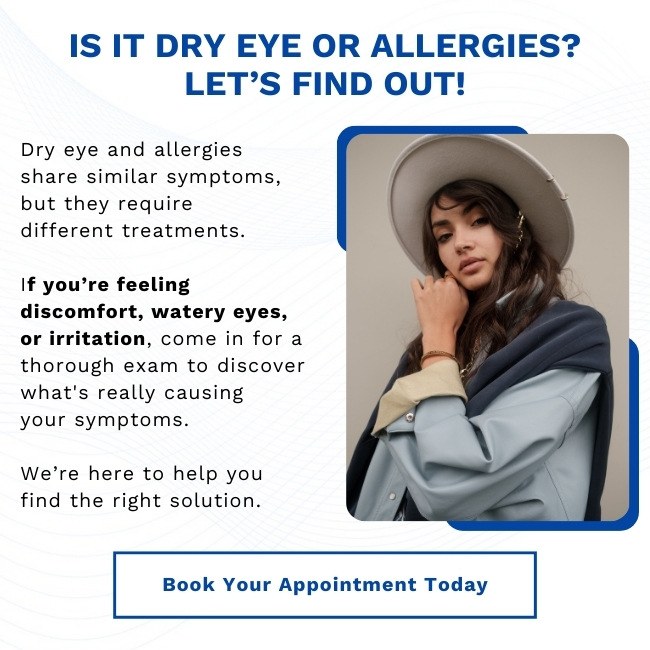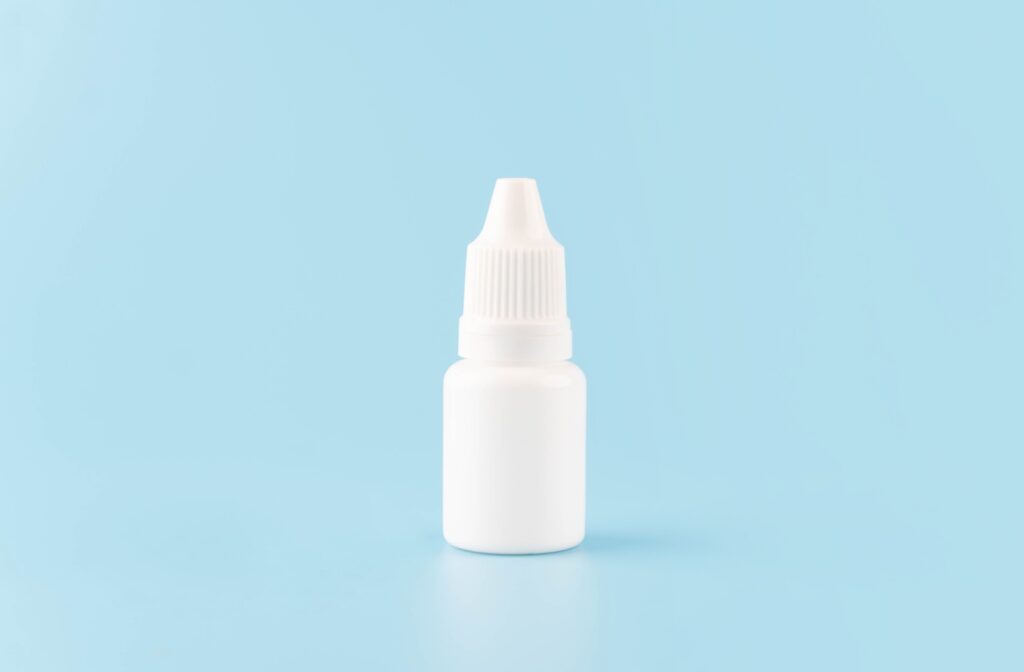Dry eyes may occur for many different reasons, from seasonal allergies to a dry, dusty environment or a problem with the eye’s ability to make high-quality tears. There isn’t a one-size-fits-all answer to getting relief because treatment often depends on the exact cause of the dry eyes.
While a saline solution is typically safe to use in your eyes for washing out contaminants or as part of an eye doctor-prescribed treatment plan, it is not usually ideal for dry eyes as it does not offer the same improvements as lubricating eye drops. You should see your eye doctor for treatment advice for persistent or recurring dry eye symptoms. They can offer tailored advice and treatment to get you relief for clear, comfortable vision.
Can Saline Solution Help with Dry Eyes?
A saline solution is essentially a sterile saltwater mixture. It’s used in many applications, from IVs to disinfecting wounds. But you may have seen saline eye drops or eye wash, too. These are technically safe for use in your eyes—as long as they’re sterile and intended for ocular use. But they aren’t usually recommended as a long-term dry eye treatment.
Research indicates that a saline solution doesn’t provide the same symptom relief or vision improvement through tear film stabilization as a specialized lubricating eye drop or other optometrist-recommended dry eye treatments.
Alternative Treatments for Dry Eyes
Fortunately, the oasis of dry eye relief isn’t limited to saline solutions. There are many options, ranging from lifestyle changes to prescription medications and even simple home remedies.
Over-The-Counter (OTC) Lubricants
Artificial tears, gels, and ointments formulated for dry eyes can offer longer-lasting moisture than saline solution. An important consideration with OTC eye drops is preservative versus preservative-free formulas. Certain preservatives can actually lead to dry eyes, so preservative-free formulas are ideal for long-term use. Ask your eye doctor for recommendations if you’re unsure which eye drops you should use.
Prescription Medications
Prescription eye drops such as Restasis or Xiidra, which target the inflammatory component of dry eye, may be necessary in more severe cases. Your eye doctor can determine whether prescription eye drops are necessary based on an eye examination.
In-Office Treatments
In-office procedures like punctal plugs, where tiny silicone or gel-like plugs are placed in the tear ducts to prevent the drainage of tears, can significantly improve moisture retention in the eye. Pelleve and TearCare are 2 other in-office treatments that could be beneficial for symptom relief that we offer at Eye Care Plus.
Lifestyle Adjustments
There are several lifestyle adjustments and home remedies you can try for non-medical symptom relief:
- Take regular screen time breaks and practice the 20-20-20 rule—every 20 minutes, take 20 seconds to look at something 20 feet away
- Stay adequately hydrated
- Use a humidifier in your home or office
- Use a warm compress on your eyes
- Make sure you get enough omega-3 fatty acids or consider supplementation
- Avoid environmental triggers, such as dusty, windy, or smokey environments
The Role of Professional Guidance
Ultimately, managing dry eye requires a multifaceted approach that often includes the advice and supervision of an eye care professional.
If lifestyle adjustments, home remedies, or OTC treatments are not providing adequate relief for your dry eye or if you experience worsening symptoms, it is crucial to schedule an eye exam.
Your optometrist can help diagnose the root cause of your dry eye and recommend a treatment plan that may include prescription medication, specialized eye drops, or procedures to manage or alleviate the symptoms.
Risk of Untreated Dry Eye
Treating your dry eyes is more than simply getting relief for comfort’s sake. Untreated dry eye risks your vision and can result in serious complications if left unchecked. These complications include corneal ulcers, an increased risk of infection due to an unstable tear film, the inability to wear or extreme discomfort while wearing contact lenses, and difficulty keeping your eyes open to see safely.
Discuss Your Symptoms with Your Eye Doctor
Using saline solution for dry eyes could be okay in an emergency, particularly for mild cases. But it’s not an ideal treatment, so you should follow your eye doctor’s recommendation on far more effective dry eye therapies.
It is important not to fixate on any single solution in the quest for dry eye relief. Acknowledge that the most effective treatment often involves a combination of approaches tailored to your unique condition and lifestyle.
Call our team at Eye Care Plus today to book an appointment. One of our experienced eye doctors can examine your eyes, review your symptoms, and offer a tailored approach to get you the relief you need for clear, comfortable vision.




